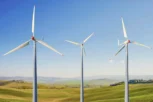Bulgaria to increase renewable energy deployment in 2023

In December 2022, Bulgaria’s Ministry of Energy concluded public consultations on legislative amendments aligning with EU Directive (EC) 2018/2011, aimed at boosting renewable energy deployment in the country. Key highlights of the Draft Act include:
Streamlining Grid Connection Procedures
- Unified Agreements: Introduction of a universal grid connection agreement for greenfield projects, replacing the current dual-stage system.
- Temporary Connections: Provision for temporary grid connections, obligating TSO/DSOs to invest in grid upgrades alongside producers.
- Early Reservations: Grid connection agreements can now be secured earlier with a reservation payment or bank guarantee.
- Shortened Deadlines: Six-month deadlines for acceptance tests and project implementation to prevent delays.
- Simplified Procedures for Small Projects: Projects up to 1 MW benefit from faster assessments and simplified grid connection processes.
Enhancing Transparency and Accountability
- TSO/DSO Oversight: Empowerment of the Energy and Water Regulatory Commission (EWRC) to enforce grid connection terms and impose sanctions for breaches.
- Information Access: Web-based IT systems will provide real-time data on grid-access agreements and capacity availability.
Empowering Energy Consumers
End consumers can become renewable energy producers, storing energy and selling surplus at market prices.
Aligning with EU Directive (EC) 2018/2011
- Renewable Energy Targets: Bulgaria aims for a 27.09% share of renewables in gross final energy consumption by 2030, up from its 2020 target of 16%.
- Simplified Permitting: Local municipalities act as “one-stop shops” for smaller projects, streamlining administrative processes.
- Self-Consumption: Regulations support renewable energy production, storage, and external sale by self-consumers.
Strengthening Other Authorities’ Roles
- Preferred Renewable Zones: The Ministers of Environment and Energy will identify preferred zones for renewable energy projects, prioritizing low-impact or underutilized lands. Projects in these zones will not require individual environmental assessments.
- Municipal Assistance: Mayors will support investors through administrative centers for planning and construction.
- Land Reclassification: The Minister of Agriculture will expedite procedures for converting agricultural land for renewable energy investments.
- EWRC Oversight on FiT Projects: EWRC will monitor and adjust reference prices for Feed-In Tariff projects to prevent overcompensation.
This Draft Act aims to accelerate Bulgaria’s renewable energy development while ensuring regulatory clarity, investor confidence, and alignment with EU sustainability goals.



